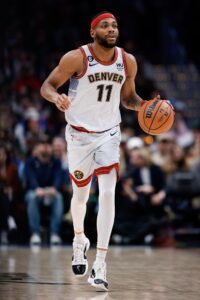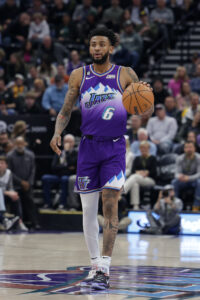For the rest of the regular season and postseason, Hoops Rumors is taking a closer look at players who will be free agents or could become free agents during the 2023 offseason. We consider whether their stock is rising or falling due to their performance and other factors. Today, we’re focusing on a handful of Northwest players.
- 2022/23: $20,955,000
- 2023/24: UFA
- Stock: Up
Grant has proven to be a nice fit in Portland, providing efficient frontcourt scoring (.613 true shooting percentage) for the team’s seventh-ranked offense. He can score in a variety of ways and is one of the team’s better defenders, though the Blazers have fallen off considerably on that end – they’re down to 23rd in defensive rating with a net rating barely above water (+0.4).
Grant will turn 29 in March and is in line for a big payday on his next contract. For what it’s worth, Portland would be limited during the season to offering a four-year, $112.65MM extension, so if he thinks he can get more than that, he’ll have to wait until free agency.
 2022/23: $6,479,000
2022/23: $6,479,000- 2023/24: $6,802,950 player option
- Stock: Up
I was surprised Brown’s free agency foray last offseason wasn’t more lucrative after a strong postseason showing with the Nets – he ended up signing a two-year deal with Denver for the taxpayer mid-level exception. It was rumored that he had higher offers and liked the fit with the Nuggets.
Either way, he has been a valuable and consistent role player alongside reigning back-to-back MVP Nikola Jokic. The versatile Brown is averaging 11.2 PPG, 4.3 RPG, 4.3 APG and 1.0 SPG on a rock-solid .492/.413/.800 (.584 TS%) shooting line through 29 games (30.2 MPG).
In addition to being head coach Michael Malone’s go-to replacement starter across multiple positions (he’s up to 17 starts), Brown is attempting – and converting – more three-pointers than ever before, up to 1.3 makes and 3.2 attempts per game, from previous career highs of 0.6 and 1.7, respectively. He has been a relative bargain thus far, but the problem for the Nuggets is if he opts out, they’ll only have his Non-Bird rights, so they’ll be limited to offering him 120% of his current contract – a deal would start at $7.8MM in 2023/24, only a $1MM raise on his player option.
If he opts out, I think Brown could at least land a deal for the non-taxpayer mid-level in free agency, which is projected to be worth $48.9MM over four years. If Denver is where he really wants to be, another option would be picking up his option and then re-signing once the Nuggets have his Early Bird rights after ’23/24 – Nicolas Batum and Bobby Portis took that route in recent years with the Clippers and Bucks, respectively.
- 2022/23: Minimum salary
- 2023/24: UFA
- Stock: Down
In five consecutive seasons from 2017-22, Forbes knocked down at least 38.8% of his three-point attempts, and he owns a career rate of 41.3%. However, he has struggled this season in his rare opportunities to play, converting just 25.8% of his looks beyond the arc in 17 games (10.6 MPG).
That’s a major problem for the undersized shooting guard, because his value is almost entirely tied to his ability to make shots — he’s limited in every other area, particularly defensively. The Wolves need shooting – they’re 22nd in 3PT% – so the fact that he hasn’t been playing obviously means head coach Chris Finch doesn’t trust him over other options. For players on minimum deals, one down season could mean they’re on the last legs of their NBA careers.
- 2022/23: $4,097,561
- 2023/24: UFA
- Stock: Neutral
After dealing with several significant injuries in his eight-year career, Winslow has been relatively healthy thus far for Portland, appearing in 28 of 31 games. You would think that alone would help his stock, but he hasn’t really shown anything different than he’s done in prior seasons from a production standpoint.
Winslow is energetic, strong, a solid rebounder, an above-average play-maker and a solid defender across multiple positions, all desirable traits. He can grab a rebound and start a fast break, or initiate the offense in a half-court setting, acting as a point forward of sorts.
However, he’s very limited as a scorer – his .415/.310/.714 (.470 TS%) shooting line is very close to his career mark – so it’s hard to envision his market being robust, despite his positive attributes.
- 2022/23: $5,009,633
- 2023/24: RFA
- Stock: Up
The No. 17 overall pick of the 2019 draft, Alexander-Walker had a very inconsistent first three seasons. He was traded twice right before last season’s deadline, going from New Orleans to Portland to Utah, and rarely saw the court with the Jazz.
His spot in the rotation is still tenuous – he has appeared in 22 of 33 games for an average of 15.3 minutes per night. Virtually all of his counting stats are similar to his career averages. So why is his stock up?
The answer is simple: he’s posting a .491/.433/.727 (.623 TS%) shooting line and has played key defense at the end of multiple close games. Less simple is the question of whether the Jazz will be inclined give him a $7,073,602 qualifying offer to make him a restricted free agent – it’s too early to make that call, but if I had to guess, I’d bet they wouldn’t right now.
Still, if he keeps shooting anything close to what he has early on, he’ll likely find a multiyear contract for more than the minimum, which definitely wasn’t a lock entering ‘22/23.
 2022/23: $6,479,000
2022/23: $6,479,000